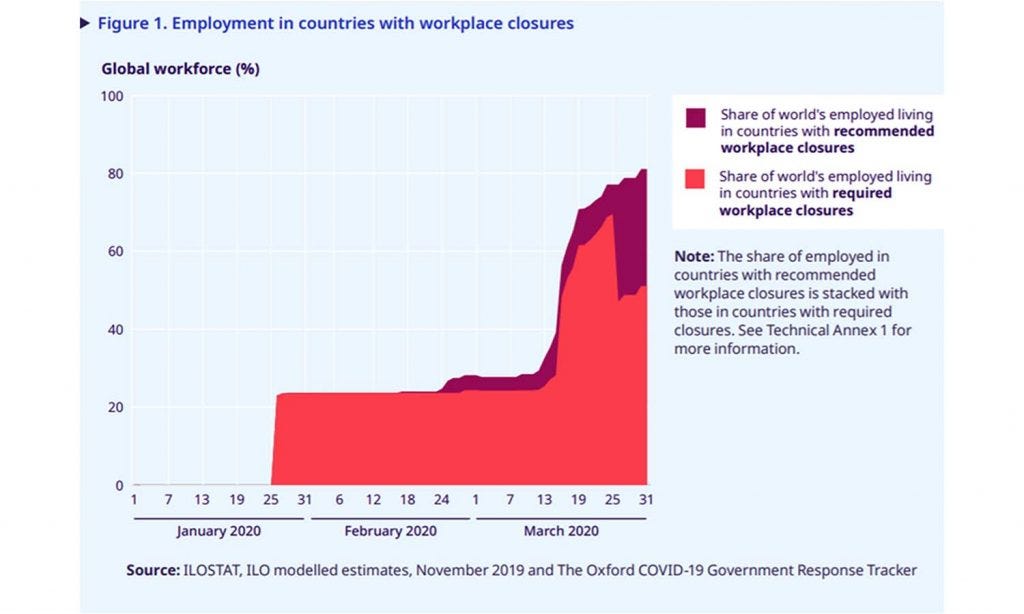When we are no longer able to change a situation, we are challenged to change ourselves. — Viktor E. Frankl
The International Labour Organization (ILO) has described COVID-19 as the worst global crisis since World War II.
Kristalina Georgieva, Managing Director of the International Monetary Fund (IMF), remarked at a recent conference organized by the World Health Organization (WHO), “Never in the history of the IMF have we witnessed the world economy coming to a standstill…It is way worse than the global financial crisis.”
These statements reveal the gravity of the mayhem caused by this coronavirus, which causes the deadly COVID-19 disease.
At the time of writing this piece, there were nearly 3.6 million confirmed infection cases and over 251,000 deaths worldwide, according to Johns Hopkins University.
As we all sincerely hope that the impact of this pandemic will weaken over the coming weeks, and that the subsequent economic fallout will not cripple us, here are some lessons we can learn from this crisis.
1. Listen, respond maturely on social media sites
Silence is not broken by speech, but by the anxiety to be heard. — Thomas Merton
These words by Merton, a Trappist monk of the Abbey of Our Lady of Gethsemani, ring true-all the more at a time when most of us are confined to lives of self-isolation and self-quarantine-and so feel the need to make ourselves heard.
However, while most of us are tempted to pontificate on social media about how governments and other officials should handle-or should have handled-the crisis from our homes, let’s think of countless others including doctors, medical personnel, police officials, postmen, waste collectors, firemen, government officials and numerous trained volunteers who are risking their lives in the field to save ours.
While we are helping these brave men and women in our own small way by staying at home, it’s important to be sensitive and ensure that our criticism of any policy or act during crises such as these (or at any other time), is constructive.
In other words, we need to think about, and offer, solutions to alter things we perceive to be wrong or misguided rather than just dismissing views that we don’t comprehend or agree with, as gibberish.
This is a tricky terrain and a humbling exercise since we have to respect the fact that others may not agree with us, or in all likelihood, know more than us.
One cannot devise policy frameworks based on gut feelings (I believe or I think), especially in an age of data analytics and artificial intelligence (AI), which can help us analyse these mountains of data in minutes or even seconds. It will help if we can back our posts with some evidence so that others can react sensibly to them.
Moreover, even as we are bombarded with fake news, one can find numerous articles and posts that are like shining beacons during this crisis.
These includes posts that are helping us to better understand and evaluate government policies, and guage where the markets and economy are heading; tips on Working From Home (WFH); tips on how motivate others during this depressing time; and so on.
Hence, before our next post, we should perhaps ask ourselves whether we are adding to, or subtracting from, this discourse.
2. Think about protecting privacy even after COVID-19 eases
They who can give up essential liberty to obtain a little temporary safety deserve neither liberty nor safety. — Benjamin Franklin
It’s hard to fault governments for advocating, and implementing, the use of location surveillance powers to contain the COVID-19 outbreak. Especially, at a time when millions are infected and thousands are dying.
As many would argue, protecting lives is of paramount importance even as considerations like privacy may take a back seat in unprecedented times like these. The reason: Many people may not respect borders, self-isolation or quarantine measures if not enforced by the authorities concerned.
That said, privacy can easily take a back seat when governments are trying to help save lives with contact tracing apps and other intense surveillance methods. This, however, need not be the case as these examples show.
3. Continue with the spirit of innovation
Innovation is taking two things that exist and putting them together in a new way. — Tom Freston
We have been glorifying startups across the world. Many of these startups continue to transform business models and provide countless jobs.
If these startups die as funding dries up in the coming months, there is a danger that smaller innovations may take a back seat since millennials may think twice before joining smaller companies.
Even small innovations should be celebrated and funded. Here are some brilliant examples of innovations during this crisis. A 3D printed respirator has been developed in Spain, and approved by medical experts.
An open-source hardware project started by a group including Irish entrepreneur Colin Keogh and Breeze Automation CEO and co-founder Gui Calavanti has produced a prototype ventilator using 3D-printed parts and readily available, inexpensive material.
Police drones in various countries that monitor streets and issue stern reminders for people to stay at home continue to pop up on social media. N95 masks are being manufactured locally.
Ship containers and train compartments in India and elsewhere are being converted into make-shift quarantine zones. Thermal scanners are using AI to monitor temperatures and issue alerts about COVID-19.
There are hundreds of such small innovations that most of us would have not even heard of, or never read. While we all can’t be an Einstein or Newton, let’s continue with this spirit of innovation even after the pandemic is over.
4. Take special care of low-paid, low-skilled workers
The job market of the future will consist of those jobs that robots cannot perform. Our blue-collar work is pattern recognition, making sense of what you see. Gardeners will still have jobs because every garden is different. The same goes for construction workers. The losers are white-collar workers, low-level accountants, brokers, and agents. — Michio Kaku
If we thought that automation will take away jobs from low-skilled workers, COVID-19 has only hastened this process. It has, thus, raised a crying need for retraining, reskilling and upskilling workers-especially those at the bottom of the pyramid.
The ILO Monitor 2nd edition: COVID-19 and the world of work is an update of an ILO research note published on 18 March that includes sectoral and regional information on the effects of the pandemic.

According to the new study, 1.25 billion workers are employed in the sectors identified as being at high risk of “drastic and devastating” increases in layoffs and reductions in wages and working hours. Many are in low-paid, low-skilled jobs, where a sudden loss of income is devastating.
Worldwide, two billion people work in the informal sector (mostly in emerging and developing economies) and are particularly at risk.
The sectors most at risk include accommodation and food services, manufacturing, retail, and business and administrative activities.
Even Unicorns (startups worth $1 billion or more) have not been immune to job cuts, with Opendoor, Carta and Zume all facing major layoffs, according to TechCrunch.
The eventual increase in global unemployment during 2020 will depend substantially on future developments and policy measures. There is a high risk that the end-of-year figure will be significantly higher than the initial ILO projection, of 25 million.
5. Pay more attention to changing hiring, work patterns
On average, by 2020, more than a third of the desired core skill sets of most occupations will be comprised of skills that are not yet considered crucial to the job today— World Economic Forum (WEF)
Apple chief executive Tim Cook is among the millions of employers who are uncertain when their staff will return to offices. However, Apple staff are likely to face temperature checks and social distancing when they do, and vacation policies will be tweaked.
Similarly, Amazon says it’s building out virus testing capacity for all of its employees. Google parent Alphabet is slowing hiring for the rest of 2020.
On his part, Facebook’s Mark Zuckerberg has cancelled all of the company’s in-person events with more than 50 people all the way up to June 2021.
McKinsey researchers suggest a host of concrete steps to address this issue.
6. Take note: Digital is here to stay
At least 40% of all businesses will die in the next 10 years… if they don’t figure out how to change their entire company to accommodate new technologies. — John Chambers
Technologies such as big data, cloud computing, supercomputers, artificial intelligence (AI), internet of things (IoT), robotics, 3D printing, thermal imaging and 5G are now routinely being used to effectively complement the traditional methods of increased hygiene, self- and forced quarantines, and enforced global travel bans.
Doctors, for instance, are diagnosing patients over the phone and video conferencing calls, suggesting that tele-health and tele-medicine may become the new normal once we all recover from the onslaught of this virus.
Governments are holding online press conferences, ushering new transparency in the governance process.
Online groceries are delivering our groceries to our homes. Governments are mooting the use of drones for the same.
Thousands of businesses are using collaboration and video-conferencing tools to stay in touch with their employees and clients. From project management tools to video chat apps, CB Insights has mapped 65+ startups enabling the remote workforce.
7. but WFH will need good bandwidth, steady supply of electricity
Do you want to access talent everywhere, or just in specific markets? If the answer is everywhere, you need to be at least open to the possibility of remote work — it opens doors to attracting and retaining talent around the world, literally and figuratively. — Katie Burke
As I pointed out earlier too, I strongly believe that the trend of Work from Home (WFH) will become the Future of Work in a developing country like India ONLY if we ensure good bandwidth and, more importantly, steady electricity supply.
As an example, even India’s Silicon Valley-Bengaluru-, and the nation’s capital city, New Delhi, are plagued with brownouts and blackouts not to talk of the perennial lack of electricity in smaller cities.
If we do not address this issue effectively, all the euphoria about working from home will remain a forced (like this COVID-19 induced one) and very urban-centric and developed country-focused buzz.
8. Meanwhile, watch your mood swings after this pandemic eases
Inner peace begins the moment you choose not to allow another person or event to control your emotions. — Pema Chodron
Past pandemics indicate that those recovering from COVID-19 infections may face a host of mental disorders going forward.
These include mood swings, insomnia, anxiety, depression, mania, suicidal tendencies, and delirium, according to a new article posted in the journal ‘Brain, Behavior, and Immunity’.
9. And remember that exercise helps as always
Whenever I feel the need to exercise, I lie down until it goes away — Paul Terry
Regular exercise may reduce the risk of acute respiratory distress syndrome, or ARDS-a major cause of death in patients with the COVID-19 virus.
A review by Zhen Yan, PhD, of the University of Virginia School of Medicine, showed that medical research findings “strongly support” the possibility that exercise can prevent, or at least reduce, the severity of acute respiratory distress syndrome (ARDS) that affects between 3% and 17% of all patients with COVID-19.
10. Finally, be humble enough to crowdsource ideas
When everything seems to be going against you, remember that the airplane takes off against the wind, not with it. — Henry Ford
Given that we are living in a networked world, I thought it best to limit my thoughts to this not-so-exhaustive list and invite others to add to it.
So feel free to add your own comments below since many of you may buzzing with ideas. However, please remember that even we disagree with each other, let’s do it respectfully. Hope we all continue to stay safe, healthy and merry.
